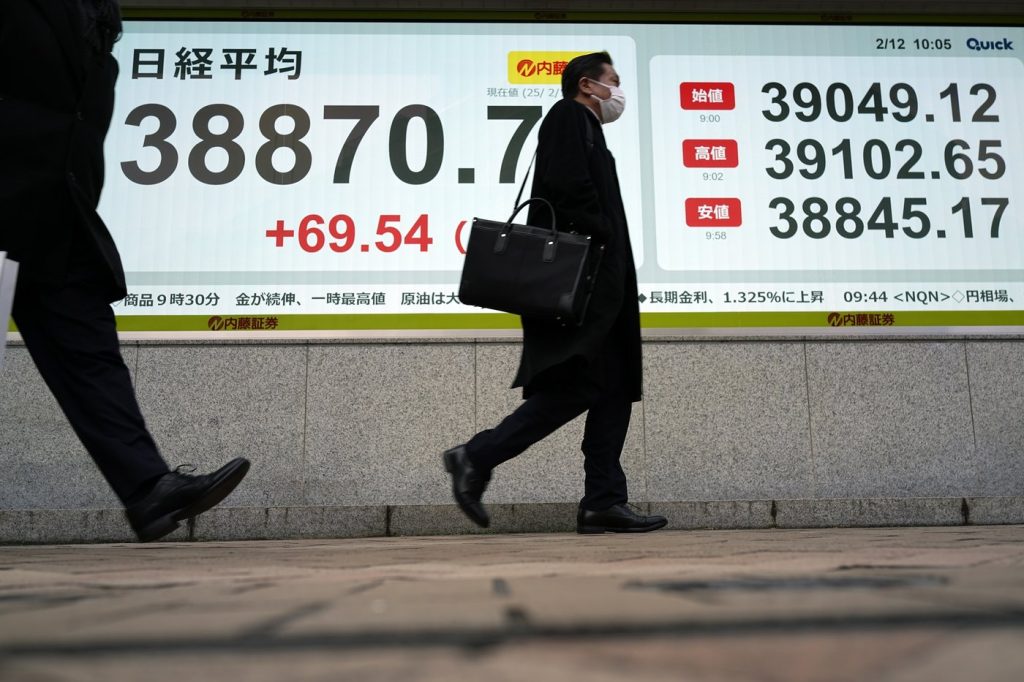TOKYO (AP) – Asian shares experienced a predominantly positive trend on Wednesday as regional markets remained attentive to President Donald Trump's latest tariff impositions. Investors expressed uncertainty regarding the potential ramifications of these policies, particularly following Trump's announcement of a 25% tariff on all foreign steel and aluminum entering the United States.
South Korea and, to a lesser extent, Japan are notable exporters of steel to the U.S. However, analysts suggest that the overall impact on their economies might be minimal since both nations export a greater volume of various other goods to the United States. Additionally, just last month, Trump implemented a 10% duty on all Chinese imports, further increasing concerns about escalating trade tensions.
In terms of regional market performance, Japan's benchmark Nikkei 225 rose 0.2% during early trading, reaching 38,863.82. The Australian S&P/ASX 200 saw an increase of 0.3%, climbing to 8,513.10, while South Korea's Kospi reported a modest uptick of 0.2%, sitting at 2,545.19. Hong Kong's Hang Seng Index surged by 2.0%, marking 21,728.71, spurred by ongoing excitement surrounding DeepSeek, though market analysts remain cautious about the sustainability of this rally. The Shanghai Composite also managed a 0.2% increase, closing at 3,325.59.
The trading environment on Wall Street reflected a subdued atmosphere, with minimal movements in both U.S. stocks and the bond market, where Treasury yields only saw slight increases. The looming threat of a trade war carries significant risks, with many on Wall Street concurring that prolonged and substantial tariffs could elevate prices for U.S. consumers and inflict considerable damage on global financial markets.
Despite these concerns, trading activity remained relatively stable, partly due to Trump's tendency to quickly retract his threats. This approach was seen earlier when he reneged on the 25% tariffs initially proposed for imports from Canada and Mexico, suggesting that such tariffs may function more as negotiation tools rather than enduring fiscal policies. This perspective has fostered a sense of cautious optimism on Wall Street about the potential for avoiding worst-case scenarios.
Solita Marcelli, chief investment officer for the Americas at UBS Global Wealth Management, indicated that "the metal tariffs may serve as negotiating leverage." Federal Reserve Chair Jerome Powell reiterated his stance during testimony on Capitol Hill, affirming that the Fed is not in a rush to further reduce interest rates. Powell noted the importance of balancing rate cuts to avoid harming the economy while simultaneously preventing inflation from escalating.
As concerns about persistent inflation have led both the Fed and market participants to reassess expectations regarding rate cuts in 2025, some traders are speculating on the possibility of no rate reductions, partly due to worries related to the impact of tariffs.
Powell expressed a measured confidence in the current economic landscape, acknowledging the potential risks of either moving too slowly or too quickly regarding rate cuts. Higher interest rates generally exert downward pressure on stock prices and elevate borrowing costs, posing risks to a U.S. stock market that has been criticized for appearing overvalued. The S&P 500 index is approaching its record high, established late last month.
To counteract potential downturns in stock prices, companies often strive to demonstrate increased profit margins. This strategy has been effective for some major U.S. corporations in their latest financial disclosures. Coca-Cola's shares surged 4.7% following the release of stronger-than-expected quarterly profit and revenue figures, supported by growth in markets like China, Brazil, and the U.S. Similarly, DuPont's stock rose by 6.8% after outperforming Wall Street's profit expectations.
Overall, the S&P 500 edged up by 2.06 points, or less than 0.1%, to reach 6,068.50. The Dow Jones Industrial Average increased by 123.24 points, or 0.3%, finishing at 44,593.65, while the Nasdaq composite fell by 70.41 points, or 0.4%, closing at 19,643.86.
In bond market activity, the yield on the 10-year Treasury note climbed to 4.53%, up from 4.50% late on Monday, while the two-year Treasury yield remained stable at 4.28%. In energy markets, benchmark U.S. crude oil prices fell by 28 cents to $73.04 per barrel, while Brent crude decreased by 26 cents to $76.74 per barrel.
In currency trading, the U.S. dollar appreciated against the Japanese yen, rising to 153.40 from 152.43 yen. The euro also saw a slight increase, trading at $1.0370 compared to $1.0363 previously.










